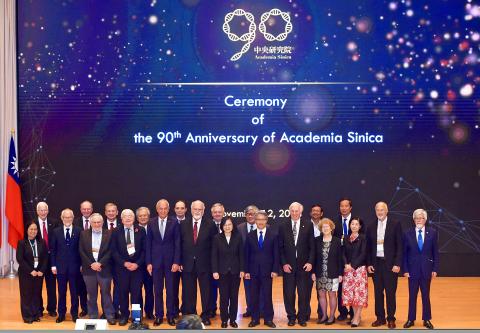Increasing “fake news” and declining trust in science are challenging academia, US National Academy of Sciences foreign secretary John Hildebrand told a gathering at Academia Sinica in Taipei yesterday, where he called on researchers to avoid bias and political actions.
Twenty academics from 15 countries attended the International Scientific Leaders’ Forum held by Taiwan’s highest academic research institution as part of its 90th anniversary celebrations on its campus in Taipei’s Nangang District (南港).
In his keynote speech, titled The Origins and Roles of Academies, Hildebrand said that contemporary populist movements see science as part of an elite order, which leads to politicization of science, decline of trust in scientists, and the spread of fake news and “alternative facts.”

Photo: Huang Yao-cheng, Taipei Times
To address these challenges, researchers should step up interaction with the public and improve general science literacy, while avoiding overt political actions and biased speeches, he said.
Okinawa Institute of Science and Technology president Peter Gruss, a researcher in gene regulation and embryonic development, gave a speech titled Can We Survive Without Science?
He said that more technological innovations are needed, as the world would be facing great transitions over the next three decades.
For example, artificial intelligence (AI)-assisted diagnostics and precision medicine could trigger a shift from therapy to prediction and prevention of diseases, he said.
Taiwan has a unique opportunity to boost its healthcare system by developing AI technologies, especially as National Health Insurance Administration data provide researchers with a wealth of information, Gruss said, adding that his institute is keen to collaborate with Taiwan.
Taiwan devotes less public funding to its basic research than South Korea, Singapore and Malaysia, Gruss said, adding that the government should allocate more funding to basic research to create momentum for technological progress.
Academia Sinica President James Liao (廖俊智) said that researchers should move forward with ambition, responsibility and wisdom, and become leaders in their research domains.
Identifying major problems facing the world, Liao said researchers should propose new solutions to control climate change, use energy and fix carbon without affecting the environment, and achieve healthy longevity in aging societies.
Areas such as AI, memory and consciousness, psychological stress alleviation, connection between past and present, and prediction of events are also worth exploring, Liao said.
Also speaking at the forum, President Tsai Ing-wen (蔡英文) said that the government would continue to support basic research.
She said she hoped that the National Biotech Research Park inaugurated in Nangang last month would attract innovators from around the world.

The German city of Hamburg on Oct. 14 named a bridge “Kaohsiung-Brucke” after the Taiwanese city of Kaohsiung. The footbridge, formerly known as F566, is to the east of the Speicherstadt, the world’s largest warehouse district, and connects the Dar-es-Salaam-Platz to the Brooktorpromenade near the Port of Hamburg on the Elbe River. Timo Fischer, a Free Democratic Party member of the Hamburg-Mitte District Assembly, in May last year proposed the name change with support from members of the Social Democratic Party and the Christian Democratic Union. Kaohsiung and Hamburg in 1999 inked a sister city agreement, but despite more than a quarter-century of

Taiwanese officials are courting podcasters and influencers aligned with US President Donald Trump as they grow more worried the US leader could undermine Taiwanese interests in talks with China, people familiar with the matter said. Trump has said Taiwan would likely be on the agenda when he is expected to meet Chinese President Xi Jinping (習近平) next week in a bid to resolve persistent trade tensions. China has asked the White House to officially declare it “opposes” Taiwanese independence, Bloomberg reported last month, a concession that would mark a major diplomatic win for Beijing. President William Lai (賴清德) and his top officials

The Ministry of Foreign Affairs (MOFA) yesterday expressed “grave concerns” after Singaporean Prime Minister Lawrence Wong (黃循財) reiterated the city-state’s opposition to “Taiwanese independence” during a meeting with Chinese Premier Li Qiang (李強). In Singapore on Saturday, Wong and Li discussed cross-strait developments, the Singaporean Ministry of Foreign Affairs said in a statement. “Prime Minister Wong reiterated that Singapore has a clear and consistent ‘one China’ policy and is opposed to Taiwan independence,” it said. MOFA responded that it is an objective fact and a common understanding shared by many that the Republic of China (ROC) is an independent, sovereign nation, with world-leading

‘ONE CHINA’: A statement that Berlin decides its own China policy did not seem to sit well with Beijing, which offered only one meeting with the German official German Minister for Foreign Affairs Johann Wadephul’s trip to China has been canceled, a spokesperson for his ministry said yesterday, amid rising tensions between the two nations, including over Taiwan. Wadephul had planned to address Chinese curbs on rare earths during his visit, but his comments about Berlin deciding on the “design” of its “one China” policy ahead of the trip appear to have rankled China. Asked about Wadephul’s comments, Chinese Ministry of Foreign Affairs spokesman Guo Jiakun (郭嘉昆) said the “one China principle” has “no room for any self-definition.” In the interview published on Thursday, Wadephul said he would urge China to